By 1940 members were fast disappearing into the armed forces while others were putting in long hours as ARP Wardens (Air Raid Precaution) or auxiliary firemen. The Eleventh Annual Dinner in January 1940 took the form of a luncheon at the County Oak Tea Room and this format continued for three years. The tradition of guests, speeches and entertainment was preserved. Severe weather conditions prevented a number of guests from attending but despite this nearly sixty people were present to hear Frank Southall propose the toast to the Club and Mrs Billie Dovey, who during 1938 had ridden nearly 30,000 demonstration miles for Sturmey-Archer, reply for the visitors. Marguerite Wilson, record breaker and guest, was unable to attend due to illness.
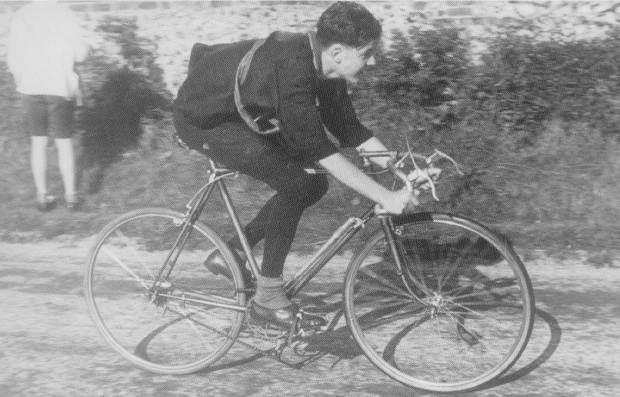
Ernie Mills and Bill Paul, both in war work, found less time to compete that year but Mills pulled off a win in the Catford 50 and Paul achieved two second places.
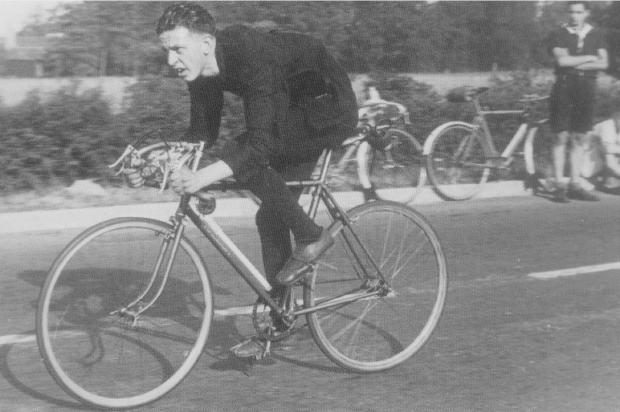
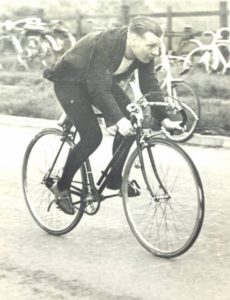
Charlie Roberts had started riding time trials in 1938 as a member of the Bellingham Wheelers and won his first ever event, the Cambrian Wheelers Novices 25. In April 1940, still only 19 years of age, he moved over to the Addiscombe and helped keep the club’s name to the fore, easily holding his own against Mills & Paul, with wins in the Gosport, Balham, Bath Road and Oxford City 50’s and the Westerley 100, his first season at these two distances. He was also second in the Catford, Norwood Paragon and Velma 50’s and third in the Clarence 25.
Approximately 50 people managed to pack into County Oak for the second luncheon held there in December 1940 (officially the club’s 12th annual dinner). In the photo the President and his lady occupy the window seat together with guests W. F. ‘sandy’ Holdworth of Holdsworth Cycles, Alex Josey of ‘Cycling’, Marguerite Wilson, record breaker, and club officials. No food is listed on the menu, it was wartime and everyone appreciated whatever the caterer, Bill Paul’s mother, was able to supply. Everyone departed happy!
An Overseas Comforts Fund was started up within the club and used mainly to purchase subscriptions to “Cycling” for members serving overseas and to supply them each with an NCU diary. Club cyclists stationed locally were invited to become guest members, the first being Pte G. E. Jones of Liverpool.
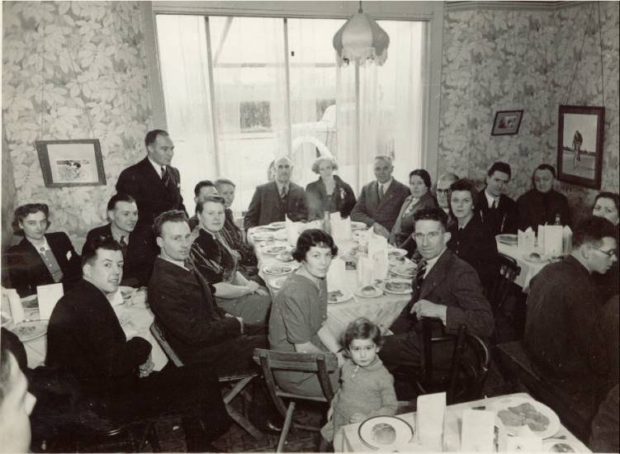
In 1941 with the club being run by those in reserved occupations the Addiscombe voted to suspend all competition for trophies for the duration of the war. The Croydon Branch of the Ministry of Information requested contact for members who would be available for carrying messages in the case of emergency. Charlie Davey undertook to draw up a list at the same time offering his address at 3 Lower Addiscombe Road, Croydon, as a focal point.
A limited programme of open time trials continued with Bruce Evans clocking up two early season wins in the Southern Counties and Calleva R. C. 25’s followed by a second and third placing before being called into the Forces. Bill Paul remained an outstanding southern rider with wins in at least six 25’s and two 50’s. Ron Baker and Jack Finch provided valuable team support. Mills and Paul were still on form on the track, scoring a number of successes and newcomer Norman Cox delighted everyone by winning the NCU 550 yards scratch London Junior track championship. What seems amazing looking back through the Minutes and Gazettes of 1941 is that the Addiscombe ran so many club events – five 25’s, two 30’s, one 50 and a hill climb. During the year, with the wearing of black tights still obligatory in time trials, the RTTC issued a statement through the Press pointing out that black stockings could be worn fastened to black football shorts. To show that locally rivalry persisted the Norwood Paragon beat the Addiscombe in a “Beer Swilling” contest – who could down 2 ½ pints in the fastest time. Due to paper shortage the Gazette, consisting of between 2 and 4 foolscap sheets (slightly larger than A4), was issued bi-monthly with one page being devoted to news received from serving members. Membership stood at 79 and the club HQ was moved to Chatsworth Hall where it remained throughout the war years.
At the season end Bruce Evans, who had been called up for service in the RAF and sadly lost his life in a flying accident before the year of 1941 was out, was awarded the Committee Cup posthumously for his early season meritorious performances. The award was presented to his mother as a permanent tribute.
Club history was made at the annual luncheon in December 1941 when Eileen Jordan collected a bronze standard medal for a 25 miles performance. She and Joyce Dean had also established an RTTC Competition Tandem record over 30 miles.
It was agreed by the club committee that the girls should be encouraged to race and by the end of the 1942 season Eileen had won at least seven Open events. She put her name on the record books with an RTTC National Bicycle Competition record at 25 miles of 1.06.17 in the Birchfield C. C. event, improving on Madge Ball’s 1937 ride of 1.07.59, and established another Competition Record in the Rookery C. C. 30 of 1.24.17. Partnered by Joyce Dean, Apollo C. C., the pair set up a Women’s Road Records Association 25 miles tandem record in 59 mins. 27 secs and later in the year won the Spelthorne Tandem 30.
Eileen rounded off her year by marrying the club’s racing secretary, Norman Waller.
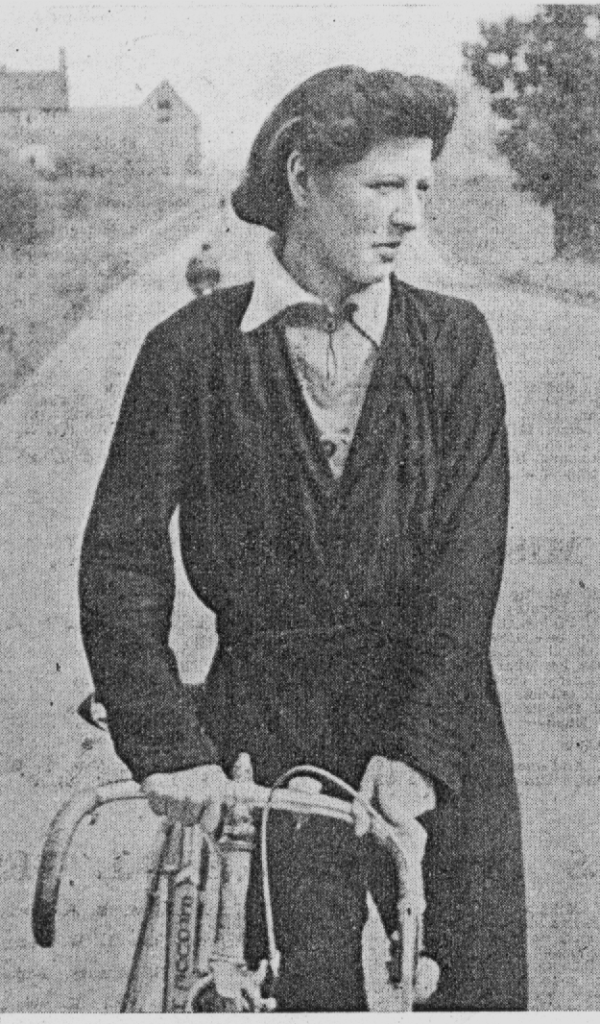
An Open Tandem 30 was promoted by the Addiscombe in June 1942. Thirty entries were received with 29 of the pairs starting. The event was won by Ernie Mills and Bill Paul in 1.04.57 and with Ted Aylett and Eddie Mundy they took the team race. Norman Cox & Bill Boynton took 2nd handicap, so, overall, not a bad day for members. Roberts, Mills and Paul continued to either win events or get highly placed and in the Norwood Paragon 50 finished 1st, 2nd and 3rd, in that order, and there was no dispute over who had won the team award. The Club then promoted a second Open 30, this time for bicycles, and 18-year-old Eddie Mundy took the fastest award with 1.13.38, only 37 seconds short of the national competition record.
Lunch and tea venues shown in the Club Runs lists often included notes such as “carry lunch” or “carry food” though “a sumptuous tea” was provided at the Blacksmith’s Head, Newchapel for the run on November 1st so it was not all doom and gloom. Night rides home were sociable affairs often made in the company of other clubs.
The decision was taken to move the Annual Dinner back to the Croydon area and the Café Royal, North End, Croydon became the choice for January 1943. The dinner continued at this venue for the next 12 years. A. P. Chamberlain, NCU secretary, proposed the toast to the club with responses to the toast of the Visitors coming from Alderman S. Roden, Mayor of Croydon, and Rex Coley, alias “Ragged Staff” the journalist.
The Annual General Meeting, held January 1943, passed a ruling permitting ladies to be accepted to full membership. It was also agreed that associate members could no longer race in the name of the club. Eileen Waller (nee Jordan) was the first lady member elected to the committee. Life Membership was introduced for valuable service of ten years or more to the club. P. A. Huggett, E. V. Mills and W. G. Paul were the first to receive this honour.
Ray Harley, Ray Cooke and A.W. (Bill) Boynton opened the season with 1st, 3rd and 7th in the Balham Roughriders 25. A young Boynton then followed this with wins in the Catford 50 and Apollo 25. The Addiscombe Open 30 was repeated in 1943 (83 entries) and for a couple of years was run in aid of the Red Cross Fund. Eileen Waller continued her run of successes. When war work permitted time off for racing, Sid and Fred Armstrong, Ray Cooke, Mills and Paul were to be found in the top ten or so of most local events. Eddie Mundy was now serving in the Navy.
An Old Addiscombians section was formed and a successful opening run held but the section seems to have faded as fast as it opened with the “old members” remaining highly active in either racing or administration, in other words, keeping the club going. Track meetings were run at Paddington, and various sports grounds including those of Norbury Police and “Acc & Tab” (a local engineering company). With spare parts hard to come by, it was at the latter company that an employee was persuaded to make a replacement fixed-wheel cog on the quiet and was given the Addiscombe member’s worn out one as a pattern. The cog was duly completed and proudly passed back – with all teeth as neatly curved as those on the worn cog!
Three more members were lost in action, Len Hobbs in a flying accident, Edgar Checkley reported killed and Walter Polatch, missing, presumed dead.
By 1944 the club was being called upon in other directions. As well as being nominated to look after the YMCA Waldrons Club support was also given to the newly formed Croydon Youth Club Movement. A week of special club runs in summer for their members was proposed in addition to roller contests and track practise at Duppas Hill. The Norwood Paragon and Apollo cycling clubs assisted in these ventures. Herne Hill track had been requisitioned during the early years of the war for air defence purposes. Work was now in hand to reclaim it for its intended use by the beginning of August and Ernie Mills inspected the club’s rented cabin to see what help and equipment was required to restore it to a usable condition. A flying bomb landed in Burbage Road with bad timing delaying the opening of the track as the track entrance was now blocked. Bill Paul appealed in The Gazette for members to help clear the debris.
Ray Cooke won the opening “classic” of the season – the Balham Roughriders – three times, 1944 to 1946. He completed the early season double in 1946 by also taking the Oak Hardriders title.
Sid Armstrong was the runs captain and 1945 saw the restoration of club runs to the coast. These, he said, would need to start at 9 am as cafes often sold out early and might not be able to offer a lunch after 1 pm. He advised the carrying of iron rations’ as a precaution. Herne Hill track was in use once more and clubs were lobbying for the Crystal Palace road circuit to be reinstated.
From the “services page” in the Gazette it is clear that many were still serving, or being posted, abroad. Charlie Roberts, J. Wishniff, and Jack Finch were serving in India, Henry Cady was in the Mediterranean, A. Wallis a prisoner of war in Japan and Percy Huggett was suddenly drafted to Ceylon. Others were more fortunate and either serving or being drafted back to England. Bill Hobbs and R. Stafford were reported killed in action.
The Open 30, won by A. Bontill of the Barnet, attracted nineteen entrants with Eddie Mundy 2nd and Ray Harley 3rd. The Southern Counties were running a few events, Sid Armstrong finishing 3rd in an early season 25 and placing 2nd in their 100. Brother Fred set a new club 100 tricycle record.
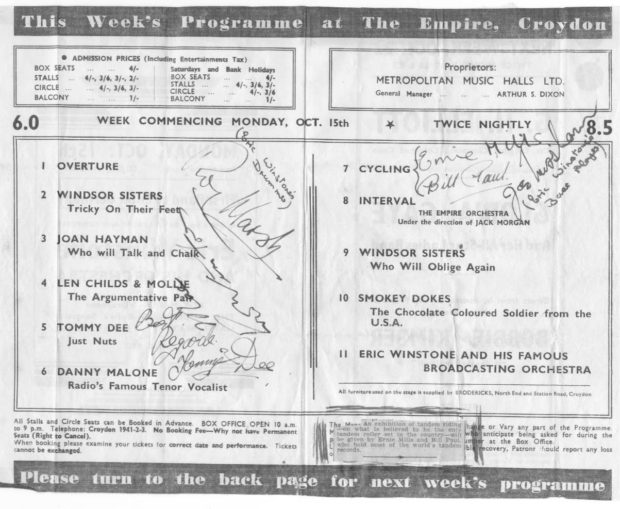
Roller racing was also proving very popular as an entertainment. Alan Stuart, Ray Cooke and Mills and Paul were riding regularly and during a series of contests held at Croydon’s Empire Theatre in 1945, amid professional acts by musicians, conjurers, etc., Mills and Paul gave demonstration tandem rides on a specially constructed set of rollers. Ernie recounted in The Gazette that life back-stage was very chaotic and that rather than climb to the top of the building to their allotted dressing room they found a spare corner to use beneath the stage. In their final performance they managed to attain 70 mph, much to the delight of the audience.
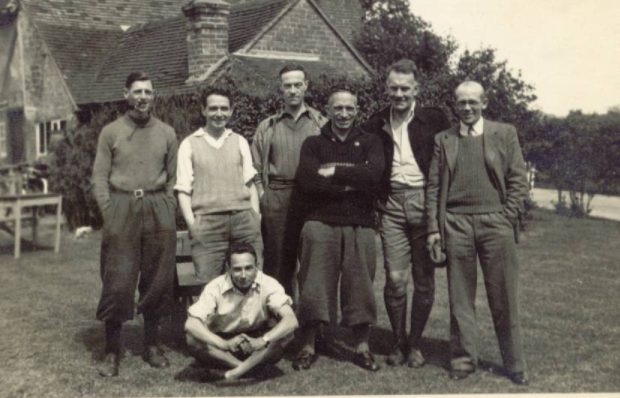
With the country gradually returning to normality the national Best All-Rounder Concert was reinstated in London. Seventy-five Addiscombe members and family attended.
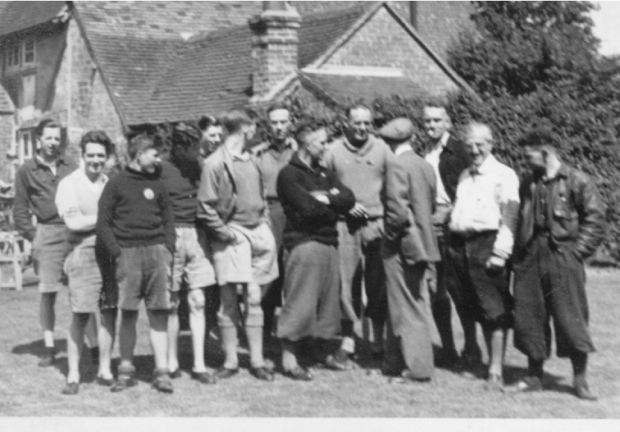
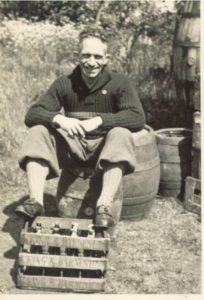
The AGM in January 1946 voted to change the Open 30 to a 50 miles event and decided it was time to put all the trophies back into competition. Service members were gradually returning to civvy street bringing renewed activity in the club and many teenagers joined clubs with racing on track, both grass and hard, and rollers proving an attraction. Charlie Roberts was demobbed from the RAF and a month later won the Southern Counties 12-hour time trial setting a new club record of 242 miles 480 yards. The club moved their HQ to St Mary’s Hall, Oval Road. With an end to the war in Europe the club acknowledged the main stalwarts who had seen the Addiscombe through the war years, namely Sid and Fred Armstrong, Bill Boynton, Ray Cooke, Harry Crumbley, Charlie Davey, Pip Heathfield, Ernie Mills and Bill Paul. Sadly five more members were reported lost in action namely Ken Cox, Frank Lee, L. Harris, E. Ingleton, and L. Martin.
As well as his achievement on a bike Ray Cooke (above) was a welding specialist. His first machine, the Carlton Flyer, was purchased from Ted Woodall of Leader Cycles, St James’ Road, and later with Ted he made his first fusion welded cycle frame. Ray took over his own workshop at the rear of Charlie Davey’s shop and during the period 1944-54 built frames for many lightweight dealers. These included Leaders (Croydon), Evelyn Hamilton (Streatham), Major Brothers (Thornton Heath), Bernard Lee (Swindon), Allin’s (Croydon – welded frames only), an aluminium welded frame for Holdsworths, plus all the Davey frames ridden by club members during this period, and some are still being ridden fifty years on.
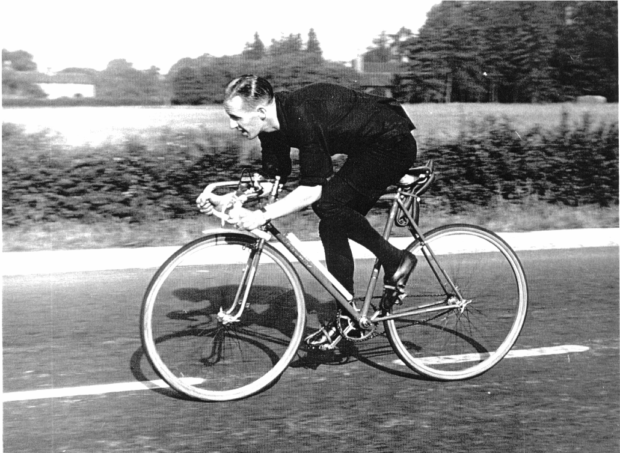
Alan Stuart, pictured, proved a useful track rider particularly in sprint and point-to-point events. With Arthur Morbin, Ray Cook, Norman Cox, Bob Eatwell, et al, plus the girls, the club put up a good show on both grass and hard track. Both Ernie Mills and Bill Paul announced their retirement from racing in 1946.
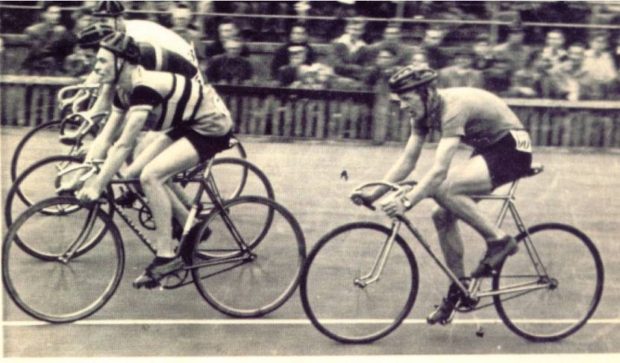
At the AGM, President Charlie Davey commented that attendance was like pre-war days. The number attending is not recorded but Charlie Roberts topped the poll for the committee with 41 votes. A Reunion Fund was opened for a welcome home function for service members. This ultimately resulted in service members receiving a free invitation to the club dinner on their return. Standard time trial medals were introduced as an incentive to all members and it was now possible to once again obtain metal club badges. It was agreed a Memorial Trophy be purchased in memory of those members lost in action and a competition was announced for a suitable design, the trophy to be presented annually for meritorious service to the club.
- An Introduction to our History
- The 1883 Addiscombe Cycling Club
- The 1906 Addiscombe Cycling Club
- An Historical Background to the Road Record Associations
- A Brief Historical Background to Cycling Time Trials
- The Club’s Revival, 1929 to 1939
- The Club in Wartime, 1940 to 1946
- The Post-War Years, 1947 to 1957
- Post-War Track and Roller Racing
- The Men in Post-War Time Trials
- The Women in Post-War Time Trials
- Post-War Closed Circuit and Road Racing
- An Influx of New Riders and the Passing of a Statesman, 1958 to 1964
- The Club Heads Towards its Golden Jubilee, 1965 to 1978
- Membership Declines, 1979 to 1987
- The Arrival of the Young Mountain Bikers, 1988 to 1994
- Another Period of Declining Membership, 1995 to 1999
- New Century and a New Look for the Addiscombe, 2000 to 2006




